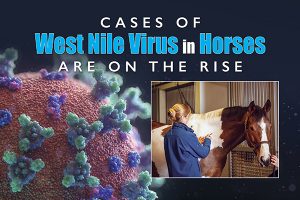Cases Of West Nile Virus In Horses Are On The Rise
Click here to read the complete article
218 – January/February, 2024
West Nile Virus (WNV) has been in this country for 24 years. This disease of birds is spread by mosquitoes and sometimes affects horses and humans as end-stage hosts. The virus entered the U.S. in 1999 with birds brought to the Bronx Zoo in New York. It is a common disease in Africa, west Asia, Europe and the Middle East.
The virus here in the U.S. is similar to WNV found in domestic geese in Israel. The 1999 outbreak affected 62 humans, with 7 deaths. There were also 25 horse cases that year. The disease quickly spread, reaching the West Coast by 2003.
Birds are the reservoir for this virus–the source of infection–and mosquitoes spread it from one animal to another. WNV infects more than 250 species of birds, but corvids (crows, blue jays and ravens) are most seriously affected; this disease is 100% fatal to crows. Many other species, from magpies to gulls and chickadees, are also susceptible, so millions of birds died as West Nile swept across the continent. Mammals are merely incidental in terms of infections via mosquito bites.
“Horses are more susceptible to developing severe illness due to WNV than humans are,” says Dr. Allison Salinger, equine veterinarian at Mid-South Equine Sports Medicine and Surgery in Tioga, Texas. “Even though this is a zoonotic disease, and a public health risk not to be taken lightly, horses are more prone to developing serious clinical signs. Their clinical signs (fever, lack of appetite, lethargy, etc.) can easily progress to paralysis and inability to swallow. They may become comatose or act aggressive; the neurologic signs can be mistaken for rabies,” she says.
Click here to read the complete article
218 – January/February, 2024











